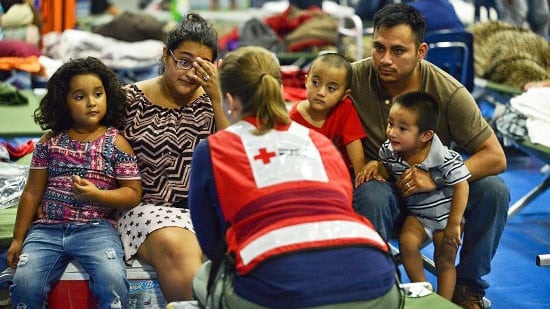HOUSTON—One month after Hurricane Harvey, Adam Hunt is stuck living in a tent on his property in New Caney, northeast of Houston.
He camps out in his yard with no electricity or running water ever since flooding destroyed the two mobile homes he and his mother lived in. Ten homes on his street alone flooded, but just as clean up began, aid disappeared, Hunt said.
“We’re kind of a forgotten neighborhood,” he told The Daily Beast.
Hunt said that volunteers and church groups passed out supplies right after the storm but that few stuck around. He spends his days helping his neighbors clean out their homes and picking up odd jobs to scrape together money.
While the Red Cross came to New Caney four times—twice with chili, twice with water and shovels—Hunt feels frustrated with the situation and says he expected more manpower to clean out houses.
“The Red Cross was never really here,” he said.
In fact, Hunt’s experience with the Red Cross was above average, according to east Texas residents who spoke to The Daily Beast. In Rose City, east of Beaumont, only one out of roughly 300 homes didn’t flood, according to Tony Wilcoxson, pastor of Rose City Baptist Church. The town went more than a month without running water.
Problems with Harvey recovery is the latest in a long list of controversies surrounding the Red Cross. The organization first came under scrutiny in 2001 after only distributing 27 percent of the more than $564 million raised in response to the Sept. 11 terrorist attacks, according to CNN.
Similar complaints arose after the earthquake in Haiti where the Red Cross “raised half a billion dollars for Haiti and built six homes,” according to a joint investigation by NPR and ProPublica then again after Sandy where a second investigation found “excessive” amounts of food waste, unsafe shelters, and resources diverted to promote a better public image.
Although the Red Cross said it began delivering supplies to Rose City on Sept. 10 and coordinated with the military to pass out “vital supplies like water and snacks” even earlier, Wilcoxson said he was unaware the relief group was in the area until well after that.
“It was like people didn’t know where we were,” he said.
Weeks later, when Wilcoxson did see the group serving meals, he was unimpressed.
“It’s pathetic,” he said. “With as much money as they have, they try to bring in these little bitty portions of black beans and carrots. We were feeding the Red Cross people, because our food was much better than what they had to offer.”
Rose City Mayor Bonnie Stevenson said even though the vast majority of their help came from churches and private volunteers, she thought the Red Cross responded quickly with shipments of food and cleaning supplies.
The Restoration Square Full Gospel Baptist Church in the Houston’s historic but impoverished Fifth Ward said it was left to fend for itself after the Red Cross fell through.
Restoration had registered as a Red Cross distribution center, according to co-pastor Tracy Glenn. “We were told we were getting supplies,” Glenn said by phone. In the end, Glenn says all she got were excuses. Red Cross told her its trucks were in Florida, then Puerto Rico.
The Red Cross responded that an individual organization cannot register as a distribution center. Instead, they decided to distribute supplies through another church in a better known area nearby.
A couple weeks after Harvey, a U-Haul truck arrived at Restoration with necessities. What Glenn initially thought was a Red Cross delivery turned out to be Houston Teamsters.
Eventually, she says gave up on the Red Cross. On Monday, a convoy of relief supplies arrived from Illinois. “Why do we have to get things from across the country when we are supposedly a Red Cross distribution center?” asked a frustrated Glenn. “That makes no sense to me.”
The Red Cross’ issues in Texas go beyond shelter and supplies. The organization announced an emergency financial assistance program that would give $400 to “qualified households” affected by Harvey. The Daily Beast received dozens of stories of people throughout Texas whose applications were rejected or ignored, including people like Adam Hunt who completely lost their homes.
When asked about the program’s qualifications, the Red Cross responded that they want to focus on “households most severely affected by Hurricane Harvey” who were displaced and “have expressed an immediate need for help with life sustaining items like food and clothing.” The Red Cross said it expects financially assist more than 370,000 households.
Hundreds of people turned up at Restoration Square on Monday to wait in line for basic necessities like water, diapers and clothing. One of them was Jimmy Douglas, whose home had flooded but not been destroyed. Douglas asked a reporter if he knew anything about Red Cross checks. Red Cross had told him to expect a call. That was the last time he’d heard from the group.
“I could really use that $400,” Douglas said. He was trying to be patient but hoped Red Cross would get in touch soon.
Across east Texas, officials are taking note of stories like these. Cynthia Jamieson, a spokeswoman with the Montgomery County Office of Homeland Security and Emergency Management, said local organizations across the entire county had to pitch in after Red Cross efforts fell flat.
“Early on, we did ask for their help,” Jamieson said. “I don’t know exactly what happened except that we didn’t receive it when we needed it.”
Montgomery County’s emergency management asked the Red Cross to set up a shelter in anticipation of Harvey as they did for Hurricane Ike and other bad storms. “This time we didn’t get any response,” Jamieson said.
The Red Cross eventually agreed to run a 500 bed shelter at the Lone Star Convention Center and a smaller one out of a church, but they never sent a manager to take charge forcing volunteers to run the shelters.
“Our people just did what they could with the knowledge that they had,” Jamieson said.
The Red Cross said that they sent a shelter manager along with cots, clean up kits and food to the Star Convention Center then handed control over to the county after a couple days. They also provided supplies to the second smaller shelter, but did not send any staff.
Houston City Councilmember David Martin criticized the Red Cross for inefficiencies and asked constituents to donate their money elsewhere, according to the Houston Chronicle.
In at least one case, Red Cross workers in the city had supplies but no trucks or drivers to deliver them, according to Houston Press. The group told the city it would take 72 hours to run background checks on drivers—forcing Judge Ed Emmett, who runs the Harris County Office of Homeland Security and Emergency Management, to bend rules in a mad rush to deliver supplies.
“I broke every bureaucratic rule in the book,” Emmett told Houston Press. “Were all these people licensed truck drivers? I don’t know—but we had to get this done.”
On Tuesday, Judge Emmett joined a group of Houston-area officials at a press conference for the city’s Hurricane Harvey Relief Fund. The officials announced grants for 28 Houston-area nonprofits. The local Red Cross wasn’t one of them.
Asked at the press conference about the Red Cross response, Emmett replied carefully. “Red Cross will always be a partner,” he said, noting that the organization has its “own funding sources.” But he said Red Cross needed to “define what they can do well and what maybe they need to let other people do.”
Emmett said he’d met with Houston Mayor Sylvester Turner to discuss the Red Cross response, among other things. “We both have this attitude of, let’s keep moving forward,” Emmett said. “Stop worrying about going back and pointing fingers.”
Francisco Sanchez, a spokesman for Harris County emergency management, echoed similar sentiments. “Red Cross will always have a role,” he said. He stressed that natural disasters can be hard to plan for and that widespread devastation had stretched Red Cross resources to their limit.
Still, the group’s response had left Sanchez frustrated. He complained that when Red Cross sent a representative to Harris county’s emergency command center during the storm, it didn’t send someone with the authority to make decisions.
“The guy was here for days on end. Hard working, passionate, working more than 12 hour shifts,” Sanchez said. “But it was someone who had to go back to management to make things happen. In the emergency management center, we need someone who can make decisions and who has the power to address challenges as they come up.”
When the city needed to open a large shelter, Sanchez said “Red Cross was not in a position to lead that effort.” That work largely fell to Baker Ripley—one of the organizations that did receive grant funding on Tuesday.
“Moving forward, I think we need to have a very candid discussion about what the Red Cross can do well,” Sanchez said. As part of discussion, he said, Harris County emergency management would need to “make sure the right partners are at the table.”







